This article is part of a series about the religious affiliations of the Carr family.
The first part focused on the Quaker Heritage of the Carr family in the 1600s and 1700s and is available at this link.
The second part focused on the Quaker Heritage of the Carr family in the 1800s and is available at this link.
The third article in this series explored the growth of the Spiritualist movement and is available at this link.
The fourth article in this series focused on Rebecca Carr Staley's experience of Spiritualism and is available at this link.
Job Carr and the Coalescence of Spiritualism, Suffrage, and Temperance
Spiritualist adherents significantly overlapped with abolition, women's suffrage, and temperance causes. Through Job Carr's example, we can see the development of social justice causes informed by his Quaker roots which valued human rights and spiritual equality for men and women. By the mid-1800s, Job and his wife Rebecca began to gravitate away from their Quaker heritage and toward the growing Spiritualist movement. Spiritualism was not exclusive of Christianity; many like Job believed in Biblical teachings, equal rights, and the ability to communicate with the deceased through Spiritualist mediums.
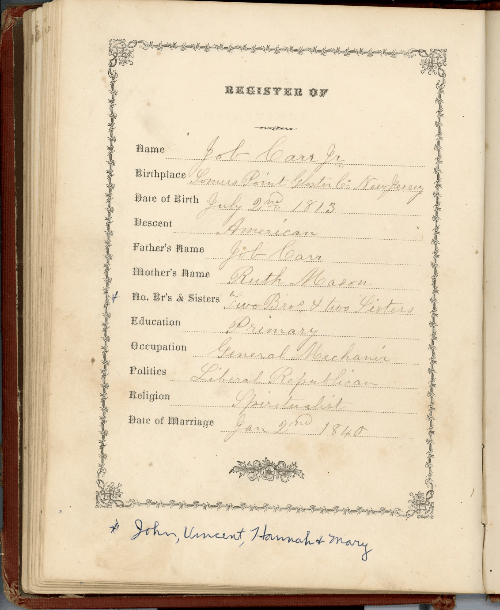
In the Carr Family Register, begun by his daughter-in-law Jane Bradley Carr, Job Carr's religion is described as Spiritualist. From the Carr Family archives.
Spiritualism and Temperance
In the 1860s, the temperance crusade began to evolve from a fringe religious cause to a more mainstream political campaign. As women became more active in the political sphere through the Spiritualist and suffrage causes, they also aligned with the push to criminalize alcohol. The Women's Christian Temperance Union was founded in 1873 in New York, in the same part of the state where the Seneca Falls women's rights convention had taken place and the location where the Fox sisters had launched the Spiritualist movement. Many of the leading voices in all three efforts found it advantageous to support each other's causes. Women's rights reformers supported temperance as a way to allow women a way out of abusive alcoholic relationships. Conversely, temperance reformers believed that their cause had a stronger chance of being implemented when women gained the right to vote.
In 1870, the population of Pierce County was about 1,400 settlers, while the rowdy town of Tacoma boasted 13 saloons. Job Carr, however, was known for abstaining from alcohol. Some Spiritualists believed that staying sober allowed them to better achieve their spiritual goals. Job's sobriety also lent him an aura of sincerity and trustworthiness; Others in the community elected him to serve as the town's first mayor and first justice of the peace even though he had no legal training.
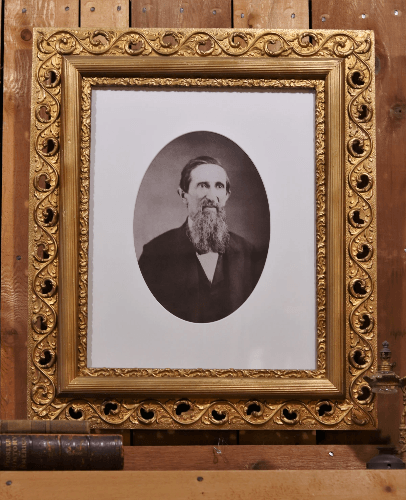
Job Carr's photo on display at Job Carr Cabin Museum
On the national stage, after several Spiritualist leaders, including the Fox sisters, were scandalized by alcohol abuse and claims of fraud, other mediums began to take up the temperance cause as a way to demonstrate their mental acuity and increase their respectability.
Also in 1870, Job Carr attended a Spiritualist revival meeting outside of Salem, Oregon. At the event, Job was elected as head of the event planning committee. Although much of the summer event was rained out, participants attended multiple lectures and seances.
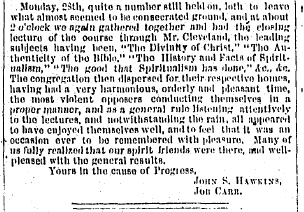
Excerpt of the report of John S. Hawkins and Job Carr about their participation in the Oregon Meeting of Spiritualists held in Butteville, Oregon from June 25 through June 28, 1870. Published in the Banner of Light, Aug. 20, 1870.
Job Carr and Women's Suffrage
Job Carr was an early subscriber to the newspaper founded and published by famed suffrage leader and Spiritualist Abigail Scott Duniway, The New Northwest. In addition to supporting women's rights, the paper also ran stories about temperance and the unjust treatment of Chinese immigrants and Indigenous people. In 1873, Job wrote to the editor of The New Northwest to renew his subscription.
"I consider it the very best journal on this Northwest coast. Treating upon every subject of reform on the broad and comprehensive platform of Human Rights with ability and zeal unexcelled, it must go far toward reaching all who are not too bigoted to read." ~ Job Carr, Letter from Tacoma to the Editor of The New Northwest, March 2, 1873
Job also took the local lead in advocating for women's rights. In June 1878, Job Carr's signature appears at the top of a petition to the Washington Territory Constitutional Convention supporting women's suffrage. Over 600 people signed the petition, including many notable names from Tacoma. Washington, however, had to wait until 1889 before its transition from territory to statehood was approved by the federal government.
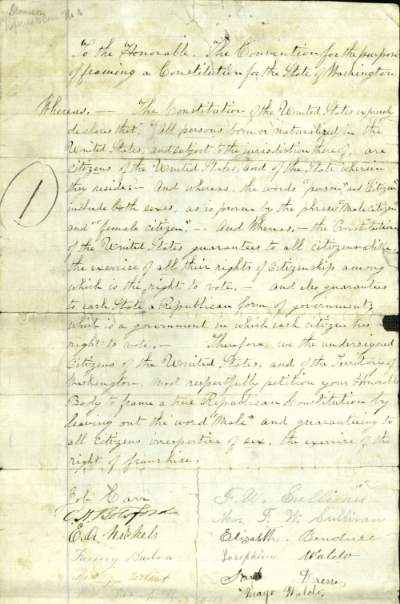
Job's signature at the top of petition supporting woman suffrage presented to the Washington Territory Constitutional Convention, June 17, 1878. From the University of Washington Libraries Special Collections, PNW00539.
Also in 1878, Job was a founding member and Recording Secretary of the Temperance and Literary Society of Tacoma. The coalescence between temperance, women's suffrage, and Spiritualism is evident in Job Carr's report to The New Northwest newspaper about this group. The Society was created at the urging of Mrs. F.A. Logan, a traveling lecturer visiting from Indianapolis. She gave two speeches, one about women's equality and the other regarding "Intemperance." Job noted that Mrs. Logan was also a spiritualist healer. She "has had several patients whom she has healed by the assistance, as she claims, (and as some of us believe) of spirit power, and she has four or five others under treatment."
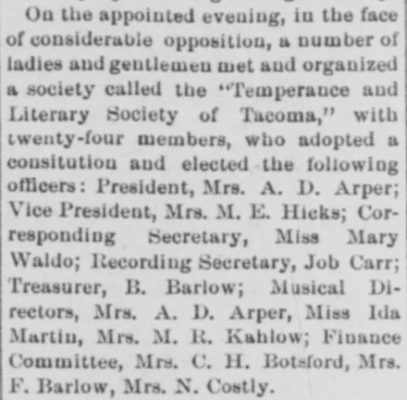
Letter from Tacoma submitted by Job Carr to The New Northwest, Portland, OR, regarding the newly formed Temperance and Literary Society of Tacoma. Published July 19, 1878.
In addition to joining this social club, Job was also reading Spiritualist texts. Job's estate in 1887 included a short list of books. Among these was "Life and Labor in the Spirit World" by Members of the Spirit-Band of Miss M.T. Shelhamer, Medium of the Banner of Light Public Free Circle, published in 1885. The Banner of Light was a weekly Spiritualist journal with a wide readership and Mary Theresa Shelhamer was one of their star mediums.
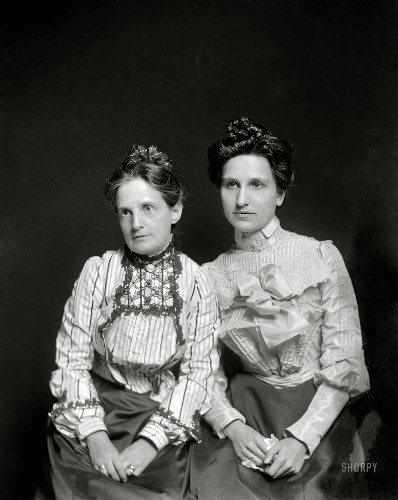
Photo of Spiritualists Mary Theresa Longley (nee Shelhamer) and Agnes Orlon Wink, ca 1902. At the time of the portrait, Mary was Secretary of the National Association of Spiritualists. She wrote several books on spiritualism, obtained a medical degree, and used her clairvoyance in her medical work as a medium healer. From Shorpy: The American Historical Photo Archive.
While the overlap of temperance and suffrage causes may have brought more women into the fight for both, it also resulted in strong opposition to equal rights from a well-funded liquor lobby. In Washington territory, women were granted voting rights by the legislature in 1883. Empowered with this political success, they quickly took up the temperance charge to close brothels and saloons across the state. Cities including Seattle began to lose tax revenue from the closures. Powerful saloon owners rallied to mount legal challenges to women's voting rights and overturned the law through the territorial supreme court in 1887. At the 1889 statehood convention, proposals for temperance and suffrage were both defeated again with successful pressure from the liquor lobby. Their fears were not unfounded; after suffrage finally passed in Washington in 1910, women continued to successfully advocate for prohibition. Although Tacoma voted against the initiative, a statewide ban on alcohol manufacture and sales passed in 1914.
From Spiritualism to Free Thinkers
While the suffrage and temperance movements continued to gain momentum in the early 1900s, the popularity of Spiritualism began to wane. This shift in religious beliefs can be seen clearly in the Carr family records of Job's descendants. A family scrapbook records Job and Rebecca, as well as three of their children Anthony, Marietta, and Margaret as Spiritualists. Their daughter-in-law Jane Bradley Carr who initiated the scrapbook, however, lists herself, her husband Howard, and their children (Job's grandchildren) as "Free Thinkers."
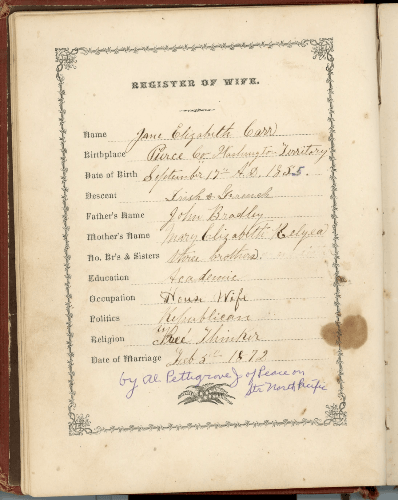
In the Carr Family Register begun by Jane Elizabeth Bradley Carr, she describes her own religious affiliation as "Free Thinker." From the Carr Family archives.
Free Thinkers were not an organized religious movement, but this trend also overlapped with leaders in the suffrage and women's rights efforts. There is no unified definition for the beliefs of Free Thinkers, but they leaned toward scientific skepticism, separation of church and state, and social justice. Suffrage leaders Elizabeth Cady Stanton and Matilda Joslyn Gage were both proponents of Free Thought. As the Free Thought movement developed it became more closely aligned with secularism and humanism.
About the Author
Holly Stewart began working as the Program Manager at Job Carr Cabin Museum in 2013. She earned a bachelor’s degree from Gonzaga University and a master’s degree from University of Washington Bothell. Her career has spanned the public, private and nonprofit sectors with a focus on education, communications, and community outreach. She enjoys sharing her love for local history with students of all ages.
